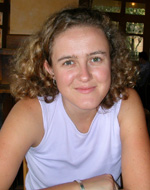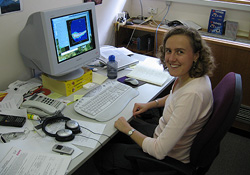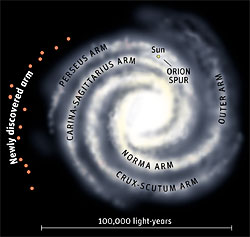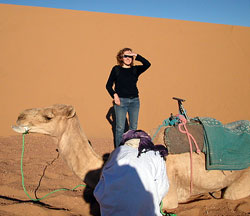Dr Naomi McClure-Griffiths - Astrophysicist

Tell us about yourself
I am 30 years old and I live in Glebe (Sydney) with my partner and cat. I was born in Atlanta, Georgia USA. Like many Americans, I moved around a bit, I grew up in Portland, Oregon, moved to Ohio for University and to Minnesota to do my PhD. And finally, I moved to Australia in late 2001. I'm an only child. My mum is an artist and dean at the Pacific Northwest College of Art and my dad's a vocational counsellor.
Where did you go to university and how did you get into astronomy?
I did my undergraduate degree in physics at Oberlin College, which is a small "liberal arts" college in Ohio. I have a slightly unusual degree because I have a Bachelor of Arts with a major in Physics. This means that in addition to studying physics I focused a lot of my study on non-science subjects that interested me like French (language and literature), religion, and history. I chose to go to Oberlin because when I finished school I wasn't sure whether I wanted to study French or physics and I knew that Oberlin would let me pursue both of those and get a broad education. And it did! During my last year at Oberlin I did an honours project in astronomy, which brought me to Australia for the first time. I had so much fun that I was hooked, both on astronomy and Australia!
I did my PhD in astrophysics at the University of Minnesota in Minneapolis. I chose U of M because I wanted to work with a professor there, John Dickey. I met John when I was in Australia as an undergrad. During my PhD I made regular trips to Australia to use radio telescopes. I used to say that my commute was across the Pacific!
What has been your career path so far?
I completed my PhD in 2001 and after two weeks of a well-deserved holiday spent mostly sleeping, I moved to Australia and began work at the Australia Telescope National Facility (ATNF) as a Bolton Post-doctoral Fellow. My Bolton Fellowship ended in September 2004 and I have stayed on at the ATNF as a Senior Post-doctoral Fellow.
What does a typical work day involve?
There is no such thing as a "typical" day for me. I spend about 2/3 of my time in Sydney at my office, and about 1/3 "on the road". Days in Sydney are mostly spent reducing observational data, writing papers, and preparing presentations about my work. I also spend some time working my two PhD students on their projects.
I have recently found myself facing some new, exciting tasks like being project scientist for a proposed upgrade to the Australia Telescope Compact Array (ATCA) at Narrabri. The other 1/3 of my time is spent away from Sydney, either overseas or observing. I observe often at both Parkes and the ATCA in Narrabri, so I pass many a night at the telescopes. I also travel overseas to conferences and work with collaborators. In the past three years my job has taken me to Japan, Germany, Spain, Canada, Mexico, the Netherlands, and the USA.

What do you most enjoy about your job?
I love almost every aspect of my job, but my favourite thing is discussing science with colleagues, whether that is in the context of a presentation at a meeting or a discussion over a cup of coffee. I just love talking science! One of the best things about being an astronomer is that I am always facing big questions about how the Universe works.
Have you 'discovered' anything important or how have you contributed to the development of science?
The emphasis on "discovery" in science has always puzzled me. All scientists discover answers about how the body or world or universe works, but when this question is asked people usually wonder whether we've discovered some THING, not some answer. I think ultimately discovering an answer is much more exciting than discovering an object. You have to work a lot harder to discover an answer. I guess that I'm lucky to have discovered a few things as well as a few answers. Probably my biggest 'discovery' - at least from the media's point of view - was the discovery of a new spiral arm in our own galaxy. That was pretty exciting.

What is the single most satisfying thing you have done in your career so far?
The most satisfying thing I have done in my career was the completion of my PhD thesis. Completing a large body of work like that is very satisfying. Some people say the best work of your career will be your PhD thesis. I'm not sure if that's true for me, but I am proud of it.
Are there any downsides or frustrations in your work?
I think the lowest point in my career was the day, early in my PhD, when I discovered that no one could tell me the 'correct' answer to the questions I was researching. Now I think that's the thing that I find most interesting about my job, but at the time it really scared me.
Every job has its frustrations - even astronomy. There are many days where I spend the whole day working on some problem only to discover that the answer is uninteresting or that I made a mistake early on. It can also be frustrating to work on something for months and realise that you just can't figure it out.
What motivated you to choose a career in science/astronomy? Were you a natural at it in school?
The answer to those questions comes in parts. Yes, I was natural at maths and science at school. I've always been curious about the world around me and liked maths. But, to be honest, I never gave a thought to astronomy. In school I discovered physics and that led me to do physics at University. It wasn't until I was at the end of my degree that I decided to pursue astrophysics. My decision was somewhat arbitrary. I decided that physics was essentially the study of either the very small (nuclear physics) or the very big (astronomy) and I felt that the general public find the very big more interesting so I decided to go that direction. About the same time I spent 6 months doing astronomical research in Australia and thought it seemed like a good life.
What do you see your career developing from here?
It's hard to guess what the future will hold, but I'd like to continue working in a position that allows me to spend a large fraction of my time doing research. I'd love to be director of a telescope - but then who wouldn't?!
What do your life beyond work involve?
There is most definitely life outside astronomy. As much as I love my job, when I leave work on Friday afternoon I don't want to do anything related to astronomy until Monday morning. So, I usually spend my weekends reading, relaxing, listening to music, seeing friends, going to movies, etc. My partner and I like bushwalking, so we try to get out walking regularly. I play Ultimate Frisbee every week with a super cool group of people and enjoy the regular trip to the pub after our game. I also enjoy swimming as a great way to clear the head and keep the body alive. And I like cooking and entertaining friends especially with a nice bottle of wine.

What advice or suggestions would you make to young people considering a career in science?
Most people go into science because they are inherently curious. It is that curiosity that drives people to do good science and it's a necessary trait to make it through the hard bits of doing science. The only specific piece of advice I can offer is to keep a perspective. When you're slogging through a hard physics prac or writing up a long paper on spiral galaxies keep in mind that the reason you're doing this is because you want to know the answer.
More Information
- Naomi's Homepage
- A new arm for our galaxy? (CSIRO media release)
- ATNF Newsletter article about the new spiral arm.
- Milky Way spiral gets an extra arm (New Scientist article)
- Possible New Milky Way Spiral Arm (Sky and Telescope news article)
- The original research paper submitted to The Astrophysical Journal can be downloaded as a PDF file from astro-ph archive.
